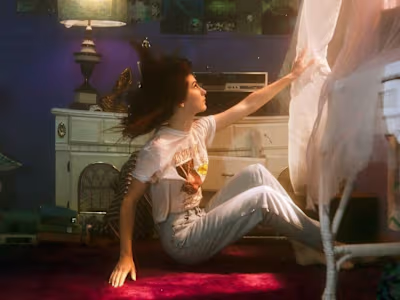Queer Country's New Home on the Range
“We got any truck drivers here today?” asks singer Orville Peck, the fringe on his signature Lone Ranger meets BDSM cowboy mask swaying as he sits down at the piano. The crowd lets out a cheer. “Well, this song is for you. It's about truck drivers in love”.
Perhaps the scene is unusual. Or would’ve been ten or so years ago. Peck is playing at Under the Big Sky Festival in Western Montana, an event which will see over 30,000 people pass through the festival’s gates during its three day run. Peck, an openly gay country crooner who brings to mind equal parts David Bowie and Johnny Cash, is on his first tour since the Covid-19 pandemic. Clad all in denim, vest embroidered with desert scenes exposing his tattooed arms, there is perhaps no better personification of the change that’s happening in country music than Peck.
For decades, the narrative that country music is exclusively white, straight, and conservative in nature, has been perpetuated in the mainstream. However, this is far from the truth. The irony of this is perhaps most pronounced in the genre’s origins. The early roots of country music as we know it today can be found in the form of slave spirituals and field hymns, which were appropriated by blackface and minsteral performers in the 1920s and 30s. The 1960s and 70s saw the rise of outlaw country brought about by the likes of Waylon Jennings, Willie Nelson and Townes Van Zandt, artists who flipped the musical bird to the establishment. Perhaps the most famous example of this outlaw nature is exemplified in Johnny Cash’s 1968 recording of “Folsom Prison Blues” at Folsom Prison, where the line “I shot a man in Reno just to watch him die'' famously elicited cheers from the inmates.
This movement proved that country was for the rebellious, those who didn’t fit into mainstream society, the outlaws. Who better to sing about life's trials and tribulations than the marginalized? The original country outlaw’s position as anti-establishment was largely self-made, based on rejection of authority and an on-the-lam lifestyle. In 2021, the outlaw spirit is still alive and well in country music, but a new generation has been christened keepers of the Zippo lighter flame: queer artists.
“Queer people love country music” says singer Brandi Carlile in an interview with NPR. “We’re kind of in the closet about that, I think, sometimes as a community.” She continues; "but we love country music. We just don't think that it's going to open its doors to us. And when it does, it's wildly satisfying." As of now, it looks as though the doors have been swung wide open. In both 2019 and 2020 Carlile won the Grammy for Best Country Song.
The idea that anyone who was anything other than straight, white, and male didn’t belong in the country music industry was largely perpetuated by the emergence of a new brand of country in the 2010s. Christened “bro country”, stars like Luke Bryan in his 2011 hit “Country Girl (Shake It For Me)”, drawled out stories of oversized pickup trucks, regretful decisions after too much tequila, and essentialized, at best, views of women. But these themes were exclusionary, creating the idea that country music was but for a small few. Now it appears country music is rediscovering the diversity in its roots. “Country music has a really long history of subversive points of view and diversity,” said Peck in a 2019 interview with the Chicago Tribune. And he’s right. The same year Johnny Cash performed at Folsom Prison, Dolly Parton released Just Because I’m a Woman, which dealt with everything from sexual double standards to suicide. Seven years later, Loretta Lynn released the gutsy, even by today’s standards, “The Pill”, an ode to birth control.
Though early country famously dealt with taboo subjects, queer representation and identity was sorely lacking in country music. That is until Lavender Country came along. One of the most subversive and oft overlooked country acts, from whom Peck is musically descended, released their eponymous album in 1973. The brainchild of musician Patrick Haggerty and members of Seattle’s gay and lesbian community, the album addressed queer identity and was perhaps well ahead of its time (a Seattle DJ lost her job for playing “Cryin’ These Cocksuckin’ Blues” off the album on air). However, Haggerty was essentially blacklisted by the music industry after the release of the album. In a 2019 interview with Dazed and Confused Magazine, Haggerty talked to Peck. “When we made Lavender Country, its not like we were stupid” said Haggerty. “We knew it was completely outrageous, that it had no chance at any kind of success, but, in truth, that turned out to be the blessing of (the band), because we weren’t catering to the industry. We weren’t catering to anyone but the Stonewall revolution folk”.
Country music is no stranger to dealing with themes of marginalization. The genre is famously chock-full of motifs of loneliness and heartbreak. Mainstays of the genre such as George Jones’ “He Stopped Loving Her Today” and Hank Williams’ “I’m So Lonesome I Could Cry” evoke the familiar melancholy of lonely cowboys weeping into glasses of Jack Daniels in empty roadside bars. But the plot is almost always the same and almost always heteronormative. However, Orville Peck sees things differently. “The thing I connected with country music when I was a kid is, it's about isolation, heartbreak, disappointment.” Peck said in an interview with Attitude. “That’s the gay experience for everyone at some point. I feel like that music is written for people who feel like the minority or feel somehow alienated”. In his song “Drive Me, Crazy” off his 2020 EP Show Pony, Peck channels those feelings of isolation and heartbreak, painting a vivid picture of two truck drivers passing each other on a lonely Midwestern highway, each catching a glimpse of the other in their rearview mirrors.
Though often hailed as outlaw country’s queer savior, the content of Peck’s songs isn’t revolutionary. He’s simply writing about what he knows. “In interviews people ask me, ‘Tell us how you sing about your relationships with men.’ It’s funny, because to me, I’m just writing a love song. My only experiences are with men, so I don’t know what else I would sing about”, he said in an interview with Dazed and Confused. It’s simply his existence as a rising country star finding success in the mainstream that is revolutionary. That being said, country isn’t just having a “gay moment” in 2020 and 2021. The Western imagery often associated with country music finds it origins in gay culture. “I play on the pastiche over-the-top cowboy imagery because a lot of that comes from spaghetti westerns, which were directed by super-gay Italian directors in the 50s” said Peck in an interview with Attitude Magazine. He continues; “so there’s loads of homoeroticism built into cowboy culture because of that, because a lot of cowboy culture now is based off those motifs, which are inherently gay”.
Integrity has always been essential to storytelling in country music. The old saying that all that is needed to write a country song is “three chords and the truth” still rings true. Accepting one's own sexuality is perhaps one of the ultimate forms of raw honesty. It looks as though artists such as Peck are succeeding in their efforts to make country music inclusionary for fans and artists alike. “A huge portion of my fans are LBGTQ and people of color, people who, somehow, feel marginalized, because maybe I represent something within country music or art in general that they can relate to on a very literal level” he said in an interview with the Chicago Tribune. “But I also have 40 year-old straight white males connecting to my music”. In its most authentic form, country transcends boundaries. Its medium is sonic, but its material is raw emotion, dealing in universal feelings of loss, heartbreak and loneliness. It's no wonder many turn to their favorite country album after a breakup, tearfully nodding along to the words of another who was once in a similar position. Prison-bound outlaws seeking refuge in a melody, or two truck drivers in love, glimpsing missed opportunity in a rear view mirror, all have a place in this new chapter of country.
Like this project
Posted Jul 30, 2024
an article I wrote focusing on music, history, and the LGBTQ+ community.
Likes
0
Views
0




